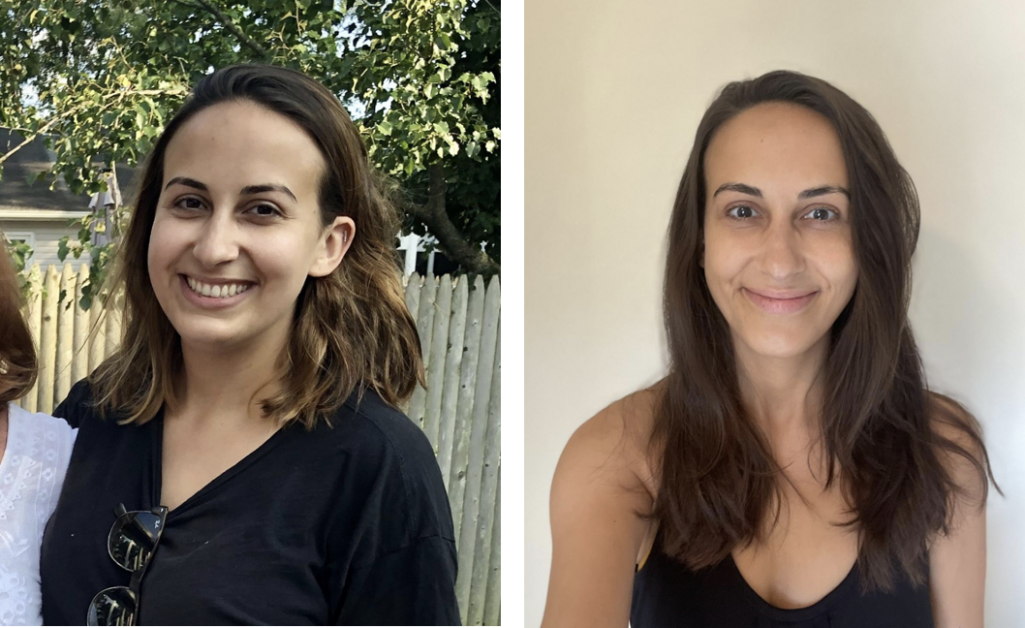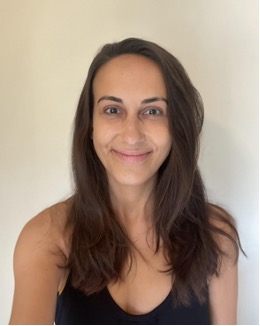Sofia Estrella is a writer and Certified NUSHU Group Facilitator. Here, Sofia shares her story how she began to develop self-trust through writing, community, and the power of NUSHU Group.

When I look at these two photos side-by-side, I think of the Robert Frost poem. You know the one, especially since we’ve all had moments in our lives where “two roads diverged.” The first photo was taken four years ago, a few months after I began swimming and therapy to help with treating a back injury. My smile showed in my eyes again but I looked pale and drained. I snapped the second photo a few weeks ago, three years into starting NUSHU Groups. In that picture, I see someone whose calm eyes and lowered shoulders convey a long-desired sense of self-trust.
As a child, I loved books and dreamt of sharing my voice as an author. My mom saved an index card from age seven that read in blocky, neat letters, “I hope to be a writer in my future.” In college I majored in English and started a creative writing track but stopped, frozen by the possibility that no one really cared what I had to say. I went to graduate school for education and obtained relative success as a teacher.
Then I herniated two discs and struggled to find effective treatment. Over two years, I sought care while continuing to work, until a fall that necessitated a leave. Here, I realized that even though it was difficult, I needed to practice prioritizing my health. I got in the water, I began Cognitive-Behavioral Therapy, I met the pain management specialist who would guide me through surgery. And I found NUSHU.
On the same index card from my childhood I also wrote, “I was thinking of what I wanted to become when I grew up. Then the idea hit me. A writer! Could I really become a writer? Of course I could! If I really wanted to.”
In elementary school, I already struggled with imposter syndrome and the question of whether my biggest dreams felt attainable.
Mostly resting in bed after the injury and subsequent fall, the desire to write began to nudge at me again, whittling at my plan to resume life walking down the same path. But it wasn’t enough to talk about this urge in therapy or with friends, because regardless of their best intentions, their voices still confused me and mixed in with my own. In NUSHU groups, rather than being a conversation with feedback solely focused on me, I heard other people’s experiences and realized that even though circumstances varied, many women also faced invalidating beasts of their own.
Facilitators asked questions where we all answered solely from our own perspectives, leading to powerful experiences based in autonomy. Unlike support groups that focused on one area of life, in NUSHU groups I talked about pain, relationships, and my dream of being an author. The people in these virtual and physical rooms held my secrets, showing me with their continued presence that in this one life, I could deepen my connections by sharing both perceived flaws and goals and listening in return.
In NUSHU groups we’re all at varying stages of life, from different areas of the globe, coming together for a short period of time to express and listen from a place of trust. For me, that trust “has made all the difference.” I will struggle with imposter syndrome for the rest of my life, but I won’t struggle with it alone.
About Sofia Estrella
Sofia is an educator and chronic pain survivor whose self-healing journey and love for learning led her to NUSHU. After earning her master’s degree from Bank Street College in education, Sofia taught in various classroom settings for nine years. She is proud to be a mentor for NUSHU Group Facilitator Training and her intention is to facilitate conversations that allow you to foster self-love and cultivate synchronicity between mind and body.
She is currently writing a novel based on her experience with chronic pain. She enjoys spending time with family in Puerto Rico and loves museums, music, and her robust cat Brooklyn (from Brooklyn).
Sign up for an upcoming NUSHU Group or join the NUSHU Group Facilitator Training waitlist.
